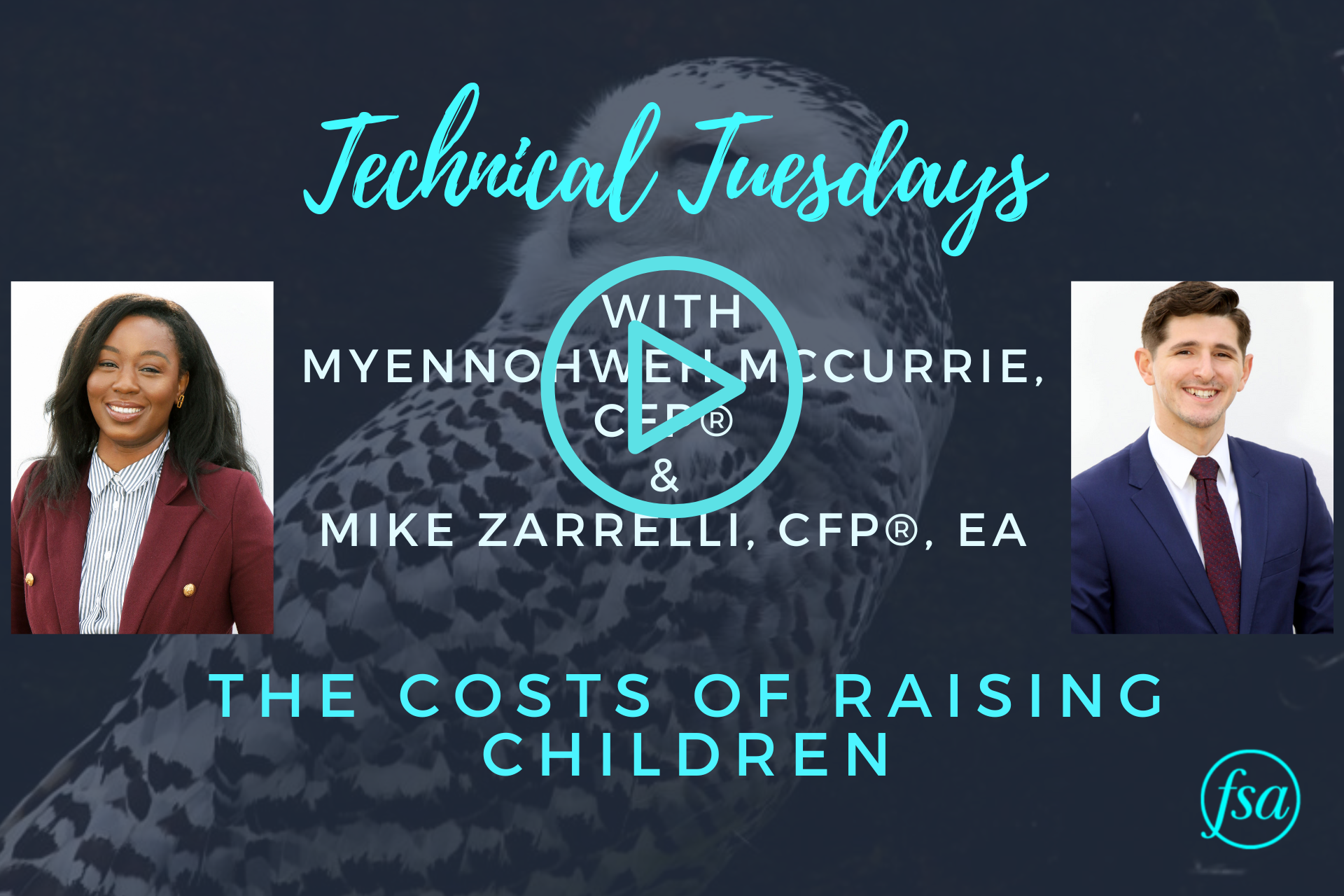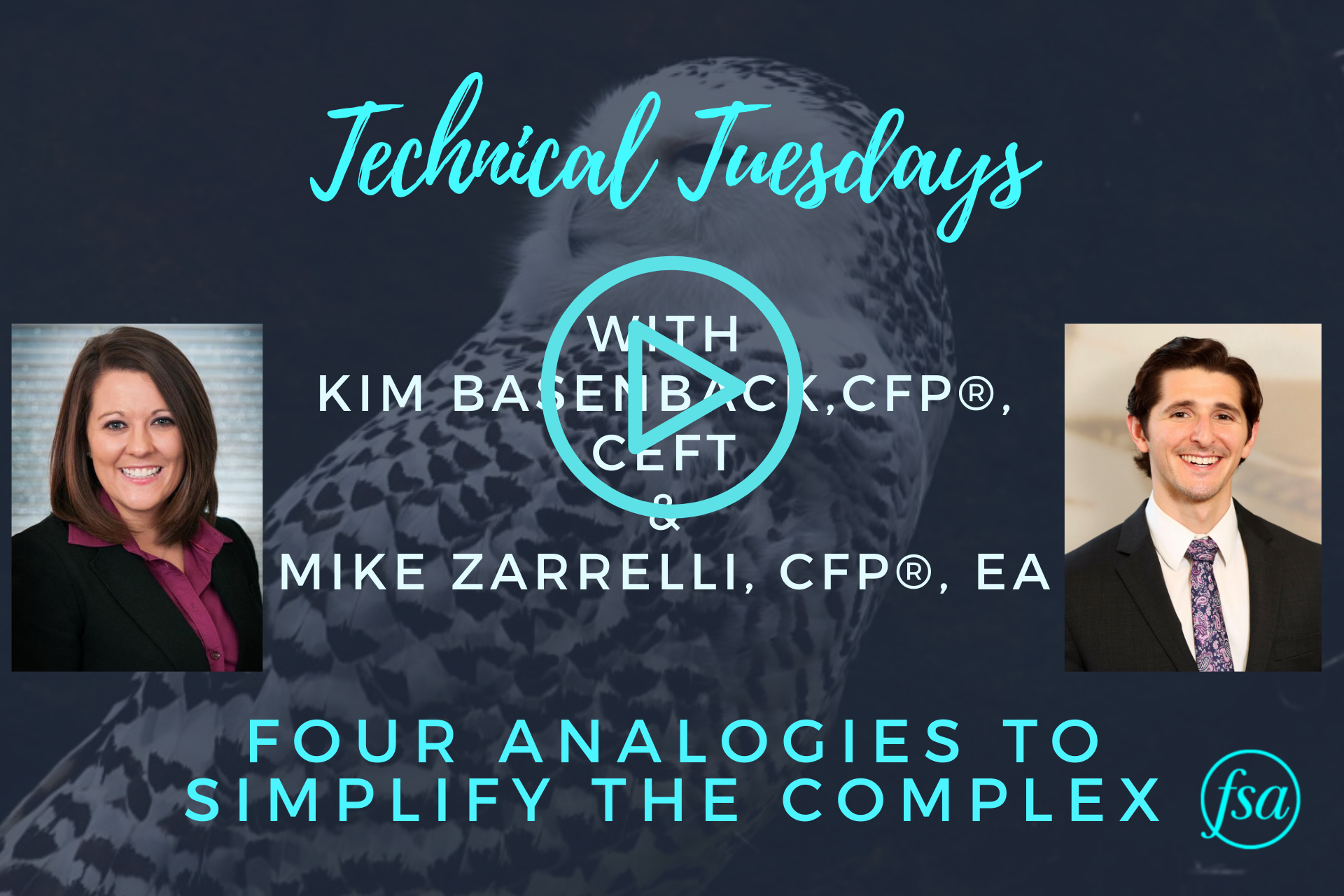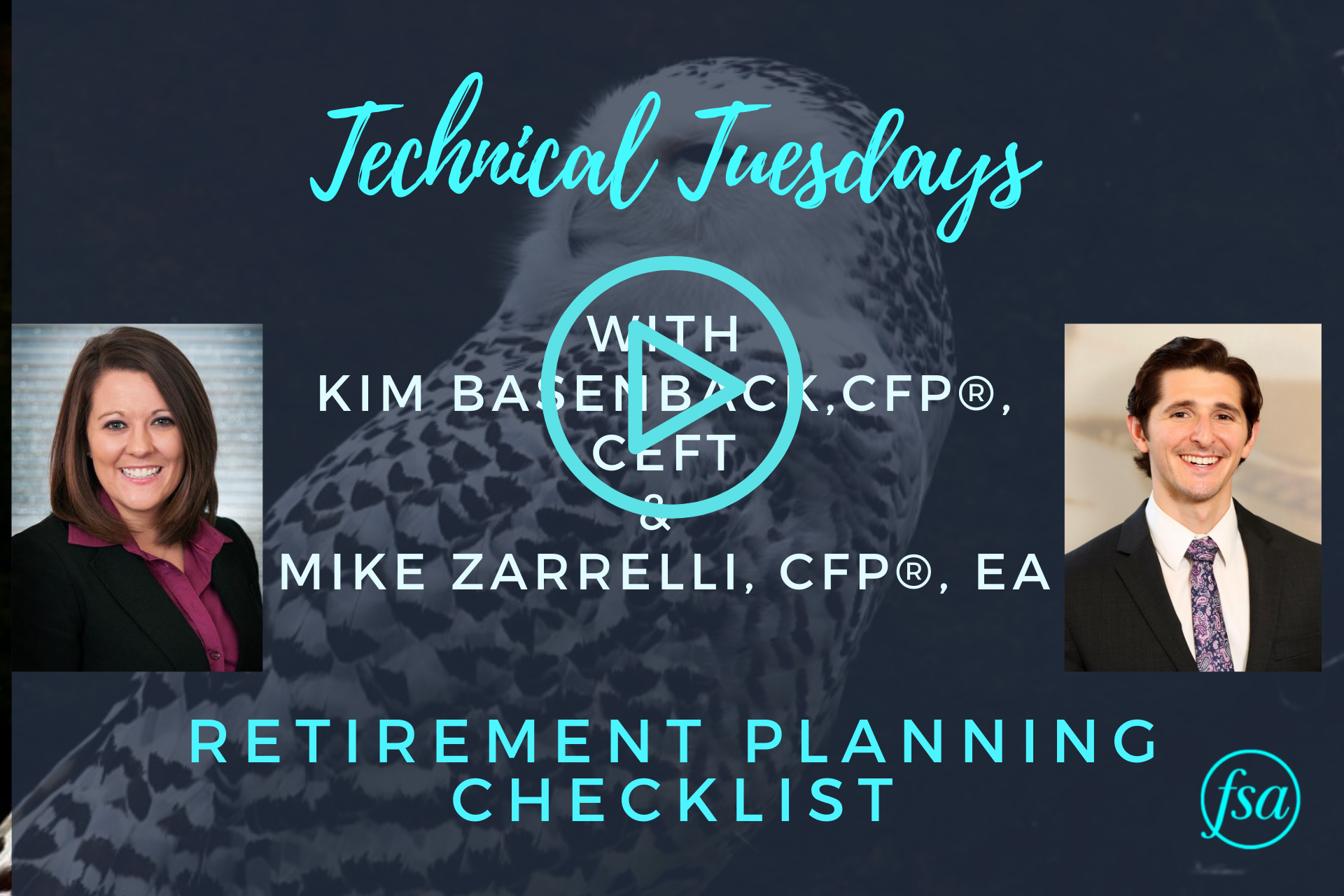Myennohweh McCurrie, CPF®, and Mike Zarrelli, CFP®, EA, chat through the cost of having kids and share some tips on how to handle those extra expenses.
The Costs of Raising Children Transcript
Mike:
I’m Mike, and with me today I have Myennohweh, another financial advisor at FSA. Myennohweh, how are you doing?
Myennohweh:
I’m doing well, Mike. How are you?
Mike:
Yeah, doing well. Today we’re onboarding a few new employees, so there’s a lot of energy in the office.
And with that, today we wanted to chat through the cost of having kids. And just some additional tips on how to handle those extra expenses. And Myennohweh is one of our lovely moms of the FSA team, so we thought she’d be a great expert to join in on the conversation. Before we jump into the details, why don’t you tell us a little bit about your kids?
Myennohweh:
Sure. I have two wonderful children. My oldest is Mariama, a girl, and she is eight years old and in the third grade. And then my second child’s name is Xavier, and he’s six years old and in kindergarten.
Mike:
Awesome. And I love that you have a boy and a girl, so you’ve got a lot of perspective on raising kids.
Myennohweh:
Yep.
Mike:
Good. Well, before we dive in, this topic comes up on the heels of a report we read from the Brookings Institution, and they found that the average middle income family with two children will spend about $310,000 each to raise those kids up to age 17, so not even including college expenses, pretty expensive.
Myennohweh:
Very expensive.
Mike:
Yeah. So if you plan on having multiple kids, you definitely need to plan for it. So Myennohweh, in your experience, what are the major expenses you’ll need to plan for when you’re deciding to have children?
Myennohweh:
When the kids were younger, childcare was definitely the highest expense that we had for them. A good childcare center in my area costs as much as $2,000 a month, and that can be a huge expense on top of your normal expenses that you have for the household. But now that they’re school aged and in public school, so we don’t have to pay that much for childcare, a lot of the cost has been replaced with their activities. So my kids do swimming, tennis, soccer, they do dance. And so those types of things kind of took the place of daycare, so the cost didn’t really go down. I think they just got more expensive toys.
Mike:
That’s true. And a lot more gas to drive them everywhere.
Myennohweh:
That’s right.
Mike:
Well, I think you hit a good point that daycare costs a lot. So let’s dive into that a little more. How did you handle those increased costs?
Myennohweh:
I think for many new parents what you’ll find is that you just naturally shift money from spending it on yourself to the kids. So if you need to find that $2,000 or whatever it might be for the daycare, you’re going to find it. And usually it’s from a sacrifice for something that you normally used to do that you’re not going to do anymore. But with that being said, my husband and I, we definitely do lean on my family that’s in the area and our friends to kind of help mitigate some of the costs. So using grandparents and my siblings for daycare in a pinch has been really helpful over the years to saving a lot of money. And also, if you’re lucky, which we actually were, the grandparents were willing to watch the kids for a significant amount of time and be their full-time childcare. So that was very helpful.
But aside from that, I think it’s also important to look at different places that you can use for childcare. For instance, you might want to use an in-home childcare facility, and those are usually a lot cheaper and they do still offer the professional loving environment that you want your kids to be in. And also, one thing that I found that I was pretty surprised about, is that some schools, such as Montessori schools, actually offer scholarships. And they’re specifically made for middle class families. So you might think, “Oh, we’re making a good income. We wouldn’t qualify for a scholarship.” But it turns out that they are available, and there’s a chance you could qualify. So if it is there, it wouldn’t hurt to try it out.
Mike:
Yeah, that’s helpful. Especially if you don’t have family or close friends that…
Myennohweh:
Right.
Mike:
Can lend a hand. Now some people, they, instead of paying for daycare, they decide one parent will just stop working for a while, stay home, take care of the kids. How would you suggest parents should come to that decision? What question should they be asking?
Myennohweh:
Yeah, I think that definitely deciding for one parent to be at home with the kids can be a tough decision. Because you do have to balance the financial needs of the family and then also the needs of the children and the parents. So from a purely financial standpoint, you really should look at how much income each parent is bringing in and then compare that to the cost of childcare. So if one of the parents makes less than the childcare for the kids would cost, then it might make sense to have that parent stay at home. But on the other hand, I think it’s also really important to consider the parent’s personal and career goals. So if you do have two parents that want to advance in their career, want to consider continue working, it would be beneficial to maybe find a better way to work that out.
So maybe one parent could work part-time and then have the kids out of daycare or even in daycare part-time as well. You definitely don’t have to have them there for a full week. And maybe the parents could adjust their schedules, have one parent work maybe in the evening or later hours so that they’re home with the children after school or something like that. So I think that kind of working together to see what really works for the two parents is very important. But either way, it’s definitely not a one-size-fits-all. And I think it’s very important to consider the physical and emotional needs of both the parents and the children.
Mike:
Yeah. Absolutely. I think you hit a really good point. As we find with most financial topics, it’s totally personal and up to what you want for your kids and for yourself. And I loved how you hit evaluating your personal goals.
Myennohweh:
Absolutely.
Mike:
Yeah, and I think that’s important.
Well, switching topics, and you could probably do a full video on this one alone, I wanted to hit education costs. They’ve just been growing astronomically. What should parents do to plan for this huge expense for their kids?
Myennohweh:
Yeah, this is definitely a huge expense for your children. And I think it’s important to have a general idea of how much college you’re willing to pay for. So some parents might want to cover the full ride, full four years, hopefully, of their kids going to college. And some might want to just do say half, for maybe one or two years. Or you might decide that you just want to give your child a specific dollar amount. So you’re going to say, “Oh, I have $50,000 or $60,000 to give you towards college, and then we can figure out how to pay for the rest.” So depending on this decision, you can then determine an approximate amount that will be needed when the child actually goes off to college. So here at FSA, we help to determine the future costs of college. But there’s also online calculators that can kind of give you a ballpark figure of how much it’s going to cost, whether it be in-state or out-of-state schools, public or private, in the future.
So once you figure out what amount of money is going to be needed, you’ll need to determine what’s the best way to save and how you plan on paying this amount in the future. Now, some people might decide that they’re just going to pay out of their income when the time comes, which is a huge expense, so you might want to consider kind of starting to save now, rather than just pulling it out of income later. But there’s several options such as 529s, Coverdell savings accounts. You could just open an investment account and kind of ear mark it for college and for the children’s college. Or you might consider maybe in the future that you’ll just take out federal loans in your name to pay for the expense. So that’s something that needs to be decided after you figure out what amount is needed.
And of course, all these options do have pros and cons. So depending on your situation, one or more may be used. But I think it’s important to keep in mind that while we do want to help our kids and we definitely want to reduce the burden, they can always take out loans for school. So if it’s the decision between, “Oh, should I save more towards retirement and kind of shore up my retirement? Or should I put this extra money towards education?” I think it would be important to put it towards retirement first and then consider extra money going towards the education part.
Mike:
Absolutely. And this is a conversation we have with clients all the time. I think it’s really important to make sure you’re on good financial footing…
Myennohweh:
Absolutely.
Mike:
Before taking on a big college payment down the road. Yeah, those are great tips.
Well, rounding third base, knowing that having a child, or multiple children, will increase your expenses, are there any other money-saving hacks or tips that you can report?
Myennohweh:
Yeah, definitely. I think once you become a parent, if you weren’t coupon clipping and looking for deals before, you’re definitely going to be looking for it after the kids. And I think there’s a lot of things that you can do. One thing which is just, you can incorporate into your children’s lives, is actually potty training them early. Diapers can be very expensive, and the price is going up, as I learned recently, from when my children were in diapers, and just kind of getting them out of them as soon as possible can definitely be a huge saver.
Another great way to save money while burning off some of your kids’ energy is finding less expensive or kind of free activities in the area. And many communities and neighborhoods have newsletters that highlight low-cost events that are in the area. So it’s good to be able to get on those list serves and then have that information fed to you weekly. And you can always make a decision on what to do and get your kids out of house and get them active.
And I also encourage parents to look outside of the area. I know my children and I have a wonderful time just going longer distances even to different states. We live in Virginia, coming out to Maryland, going into Pennsylvania, so it’s not too far. But looking at other states and being able to explore activities in those areas – it’s great for the kids, gets them moving. And also lets you guys do something together as a family. And since you’re looking for cheaper and less expensive activities, you’re able to do that in another state and really have fun over there.
And I also think that there are a lot of local parent groups that also are great resource. So they can point you in the direction of where to take your kids to get haircuts, what are some of the best activities that are going on in the area, some of the best daycares and really give first-hand knowledge and experience with different things that your kids will need. So I think joining a parent group or a mom group is definitely another way to find great ways to save money.
And for me, I also like a website called certifikids. And it’s kind of like a Groupon for family activities. And there there’s activities all over the U.S., so even if you’re visiting grandma in another state, you can find something that might be going on in that state, and they have a Groupon and savings for stuff over there. And I really love using this website. I’ve used it to do everything from finding apple picking places in the fall and actually having a great deal to go to Disney World. So they offer a wide range of activities from summer camps to hotel deals, and I would definitely recommend that for saving money.
Mike:
Awesome. Yeah, those are some great money-saving tips. I know growing up as a kid, my parents would take us to the biggest playgrounds or wherever they were. Some would have castles or pirate ships or whatnot. And those are some of my fondest memories.
Myennohweh:
Yep.
Mike:
And free, too, of course.
Myennohweh:
Yes.
Mike:
Well, we hope you found this information helpful. If you did, leave us a like or a comment. Just helps us get feedback. And if you have other topics you want us to chat through, happy to do it. Any other questions or if you want a plan to just help you get ready for those expenses that come along with kids, feel free to reach out to us at questions@FSAinvest.com, or we’re always available at (301) 949-7300.
This has been our March Technical Tuesdays. Thanks for watching.
FSA’s current written Disclosure Brochure and Privacy Notice discussing our current advisory services and fees is available at www.FSAinvest.com/disclosures or by calling 301-949-7300.




